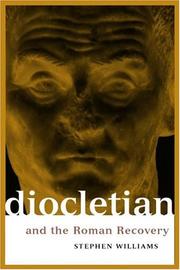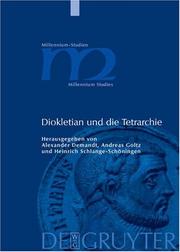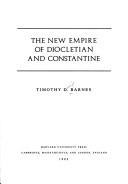| Listing 1 - 8 of 8 |
Sort by
|
Book
ISBN: 3110109344 3110846500 9783110109344 Year: 1987 Volume: 27 Publisher: Berlin: de Gruyter,
Abstract | Keywords | Export | Availability | Bookmark
 Loading...
Loading...Choose an application
- Reference Manager
- EndNote
- RefWorks (Direct export to RefWorks)
Keine ausführliche Beschreibung für "Diocletian und die Erste Tetrarchie" verfügbar.
Diocletian, --- Rome --- History --- Dioclétien --- Diokletian ‹Römisches Reich, Kaiser›. --- Geschichte 293-303. --- Römisches Reich. --- Tetrarchie. --- Tetrarchie --- HISTORY / General. --- Diocletianus, --- Dioklecijan, --- Diokletian, --- Diokghetianos, --- Diocleziano, --- Diocleciano, --- Cayo Aurelio Valerio Diocleciano,

ISBN: 0415918278 1138172006 0203461037 1136611932 1136611924 Year: 1996 Publisher: New York : Routledge,
Abstract | Keywords | Export | Availability | Bookmark
 Loading...
Loading...Choose an application
- Reference Manager
- EndNote
- RefWorks (Direct export to RefWorks)
Diocletian, --- Rome --- History --- Histoire --- Diocletian Emperor of Rome --- Rim --- Roman Empire --- Roman Republic (510-30 B.C.) --- Romi (Empire) --- -History --- -Diocletian, --- Diocletianus, --- Dioklecijan, --- Diokletian, --- Diokghetianos, --- Diocleziano, --- Diocleciano, --- Cayo Aurelio Valerio Diocleciano,
Book
ISBN: 1474498671 147449868X 1474498655 9781474498678 9781474498654 9781474498685 Year: 2022 Publisher: Edinburgh
Abstract | Keywords | Export | Availability | Bookmark
 Loading...
Loading...Choose an application
- Reference Manager
- EndNote
- RefWorks (Direct export to RefWorks)
In AD 293 the Roman world was plunged into a bold new experiment in government. Four soldiers shared the empire between them: two senior emperors, Diocletian and Maximian, and two junior emperors, Constantius and Galerius. This regime, now known as the Tetrarchy, engaged with dynastic power in thoroughly unconventional ways: Diocletian and Maximian presented themselves as brothers despite being unrelated; Diocletian and Galerius repeatedly thwarted the dynastic ambitions of individual Tetrarchs and their sons; the sons themselves were variously hostages, symbols of imperial unity and possibly targets of assassination; and the importance of women to imperial self-representation was much reduced.This is the first book to focus on the Tetrarchy as an imperial dynasty. Examining the dynasty through the lens of Rome's armies, it presents the Tetrarchic dynasty as a military experiment, created by a network of provincial career soldiers and tailored to the needs of the different regional armies. Mustering a diverse array of evidence, including archaeology, coins, statuary, inscriptions, panegyrics and invective, the author provides bold new interpretations of Tetrarchic dynastic politics, looking at brotherhood, empresses, imperial collegiality, military politics, hereditary succession and the roles of sons within Rccman
Diocletian, --- Diocletianus, --- Dioklecijan, --- Diokletian, --- Diokghetianos, --- Diocleziano, --- Diocleciano, --- Cayo Aurelio Valerio Diocleciano, --- Rome --- Europe --- History --- HISTORY / Ancient / Rome. --- Maximian, --- Constantius --- Galerius, --- Politics and government --- Politique et gouvernement --- Empereurs --- Succession --- Dioclétien

ISBN: 3110182300 3110914603 3111819841 Year: 2012 Volume: 1 Publisher: Berlin/Boston De Gruyter
Abstract | Keywords | Export | Availability | Bookmark
 Loading...
Loading...Choose an application
- Reference Manager
- EndNote
- RefWorks (Direct export to RefWorks)
"As a statesman a genius of the first order" was Theodor Mommsen's verdict in 1886 on Diocletian, the Dalmatian whose career took him from a released slave to Emperor. Diocletian stabilised the Imperium after it had been thrown into turmoil in the imperial crisis of the period of military anarchy. After his abdication in 305, he retired to the magnificent palace of Spalato (Split, Croatia) built for his old age. Although his arrangements for the succession, his price controls and his anti-Christian policies were not a lasting success, his comprehensive reforms created the basis for Constantine and the transition to the Late Classical Age. Renowned scholars from Germany, Great Britain, Croatia, Slovenia and Switzerland contributed to an international conference held in Split in 2003. Their papers collected here show the present state of research on the Tetrarchy in its political, social, economic, ideological, historico-religious and archaeological aspects and on the reception of Diocletian up to modern times. "Ein staatsmännisches Genie ersten Ranges", so nannte Theodor Mommsen 1886 Diokletian, jenen Dalmatiner, der es vom Freigelassenen bis zum Kaiser gebracht hatte. Diokletian hat das in der Reichskrise der Soldatenkaiserzeit zerrüttete Imperium wieder stabilisiert und sich nach seiner Abdankung 305 in den großartigen Alterspalast Spalato (Split, Kroatien) zurückgezogen. Wenn er auch mit seiner Nachfolgeregelung, seiner Preiskontrolle und seiner christenfeindlichen Politik keinen dauerhaften Erfolg hatte, so boten doch seine umfassenden Reformen die Voraussetzungen für Constantin und den Übergang in die Spätantike. Die hier vorgelegten Beiträge der 2003 in Split durchgeführten internationalen Tagung namhafter Gelehrter aus Deutschland, Großbritannien, Kroatien, Slowenien und der Schweiz präsentieren die Forschungslage zur Tetrarchie, zu ihren politischen, sozialen, ökonomischen, ideologischen, religionshistorischen und archäologischen Aspekten sowie zur Rezeption Diokletians bis in die Neuzeit.
Diocletian, --- Diocletianus, --- Dioklecijan, --- Diokletian, --- Diokghetianos, --- Diocleziano, --- Diocleciano, --- Cayo Aurelio Valerio Diocleciano, --- Rome --- Rim --- Roman Empire --- Roman Republic (510-30 B.C.) --- Romi (Empire) --- Byzantine Empire --- Rome (Italy) --- History --- Diocletian, Emperor of Rome --- Congresses --- Diocletian, 284-305 --- Empire, 284-476 --- Diokletian. --- Rezeption. --- Tetrarchie. --- HISTORY / Ancient / General. --- Tetrarchy --- Diocletian
Book
ISBN: 9782503574479 2503574475 Year: 2017 Publisher: Turnhout : Brepols,
Abstract | Keywords | Export | Availability | Bookmark
 Loading...
Loading...Choose an application
- Reference Manager
- EndNote
- RefWorks (Direct export to RefWorks)
A new exploration of the Great Persecution The Great Persecution under Diocletian and his imperial colleagues and successors is a foremost concern of modern scholarship on Roman persecution of Christians. This book is a systematic and comprehensive study of that persecution. Its focus is on events from 284 when Diocletian became emperor, to 313, when full religious liberty was granted to all religions by the so-called Edict of Milan. At least nine imperial orders were issued in 303 to 312 against Christianity. While Diocletian?s orders were more concerned with the privileged upper classes of Christians, Maximinus Daia?s orders were aimed at isolating all Christians from the Roman community. The enforcement of the imperial orders, and the sufferings of Christians under them, are examined on a diocese-by-diocese basis, comparing the situation in the West and in the East. In the late fourth century, Prudentius of Calahorra, poet and imperial official, complained about the loss of records on local martyrs, exclaiming, ?Alas for what is forgotten and lost to knowledge in the silence of the olden time! We are denied the facts about these matters, the very tradition is destroyed.? This book draws together the remains of what Prudentius feared was forgotten for ever.
Persecution --- Christianity. --- History --- Rome --- Church history --- Martyrdom --- Christian martyrs --- Religion and law --- Christianity --- Diocletian, --- Diocletianus, --- Dioklecijan, --- Diokletian, --- Diokghetianos, --- Diocleziano, --- Diocleciano, --- Cayo Aurelio Valerio Diocleciano, --- Politics and government --- Death --- Suffering --- Martyrs --- Christians --- Religious persecution --- Atrocities --- Apostolic Church --- Church, Apostolic --- Early Christianity --- Early church --- Primitive and early church --- Primitive Christianity --- Fathers of the church --- Great Apostasy (Mormon doctrine) --- Law --- Law and religion --- Religious aspects --- Persecutions
Book
ISBN: 1316421791 1108916775 Year: 2021 Publisher: Cambridge : Cambridge University Press,
Abstract | Keywords | Export | Availability | Bookmark
 Loading...
Loading...Choose an application
- Reference Manager
- EndNote
- RefWorks (Direct export to RefWorks)
The oration presented in this volume is critical to our knowledge of Constantine's early career and covers Maximian's rebellion, Constantine's claim of descent from Claudius II and his vision of Apollo. Written in AD 310, two years before Constantine's capture of Rome and his acceptance of Christianity, the speech gives a unique insight into the evolution of an imperial persona. This commentary examines the literary context of the panegyric and the role of the classical literary and rhetorical tradition in the recreation of Constantine's image. From the outset, the orator praises Constantine as separate from the imperial college: a deus praesens, god manifest, to the people of Gaul. He uses Lucan and Caesar to link Maximian's bid for power with the civil war between Caesar and Pompey while Vergilian allusion associates Constantine with Augustus.
Speeches, addresses, etc., Latin --- History and criticism. --- Maximian, --- Diocletian, --- Diocletianus, --- Dioklecijan, --- Diokletian, --- Diokghetianos, --- Diocleziano, --- Diocleciano, --- Cayo Aurelio Valerio Diocleciano, --- Massimiano Herculius, --- Massimiano, Marco Aurelio Valerio, --- Maximianus, Aurelius Valerius, --- Maximianus, Marcus Aurelius Valerius, --- Panegyrici Latini. --- Duodecim panegyrici Latini --- Panegyrici veteres --- Oratores panegyrici --- Rome --- Rim --- Roman Empire --- Roman Republic (510-30 B.C.) --- Romi (Empire) --- Byzantine Empire --- Rome (Italy) --- History --- Sources.
Book
ISBN: 9783412525187 3412525189 3412525200 Year: 2022 Publisher: Wien Böhlau Verlag
Abstract | Keywords | Export | Availability | Bookmark
 Loading...
Loading...Choose an application
- Reference Manager
- EndNote
- RefWorks (Direct export to RefWorks)
(Produktform)Hardback --- Christianisierung --- Alexander Demandt --- Antike Sklaverei --- Konstantin der Große --- Justinian --- Diokletian --- Spätantike --- Diocletian, --- Constantine --- Constantijn, --- Constantin, --- Constantin --- Constantine, --- Constantino --- Constantinus Flavius Valerius Aurelius, --- Constantinus --- Constantinus, --- Costantino --- Costantino, --- Flaviĭ Valeriĭ Avreliĭ Konstantin, --- Flavius Valerius Aurelius Constantinus Augustus, --- Flavius Valerius Aurelius Constantinus, --- Flavius Valerius Constantinus, --- Konstantin, --- Konstantin --- Kōnstantinos, --- Kōnstantinos --- Konstantyn, --- Kostandianos --- Κωνσταντίνος, --- Флавий Валерий Аврелий Константин, --- Константин --- Константин, --- Flavije Valerije Konstantin --- Diocletianus, --- Dioklecijan, --- Diokletian, --- Diokghetianos, --- Diocleziano, --- Diocleciano, --- Cayo Aurelio Valerio Diocleciano, --- Rome --- Europe --- History

ISBN: 0674611268 9780674611269 Year: 1982 Publisher: Cambridge (Mass.): Harvard university press,
Abstract | Keywords | Export | Availability | Bookmark
 Loading...
Loading...Choose an application
- Reference Manager
- EndNote
- RefWorks (Direct export to RefWorks)
Diocletian, --- Constantine --- Rome --- Politics and government --- Politique et gouvernement --- Constantine I, Emperor of Rome --- Diocletian Emperor of Rome --- -Constantine I, Emperor of Rome --- -Diocletian, --- Diocletianus, --- Dioklecijan, --- Diokletian, --- Diokghetianos, --- Diocleziano, --- Diocleciano, --- Cayo Aurelio Valerio Diocleciano, --- Constantijn, --- Constantin, --- Constantin --- Constantine, --- Constantino --- Constantinus Flavius Valerius Aurelius, --- Constantinus --- Constantinus, --- Costantino --- Costantino, --- Flaviĭ Valeriĭ Avreliĭ Konstantin, --- Flavius Valerius Aurelius Constantinus Augustus, --- Flavius Valerius Aurelius Constantinus, --- Flavius Valerius Constantinus, --- Konstantin, --- Konstantin --- Kōnstantinos, --- Kōnstantinos --- Konstantyn, --- Kostandianos --- Κωνσταντίνος, --- Флавий Валерий Аврелий Константин, --- Константин --- Константин, --- Flavije Valerije Konstantin --- Diocletian, - Emperor of Rome, - 245?-313? --- Constantine - I, - Emperor of Rome, - -337 --- Rome - Politics and government - 284-476
| Listing 1 - 8 of 8 |
Sort by
|

 Search
Search Feedback
Feedback About UniCat
About UniCat  Help
Help News
News